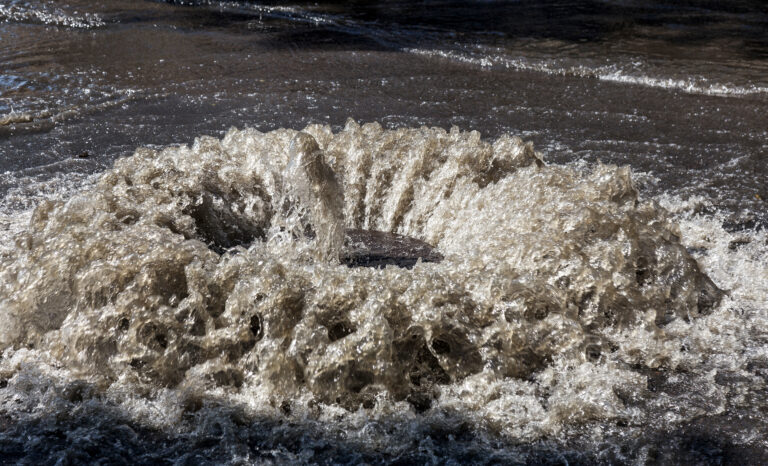New York State Supreme Court Rules NYC Department of Environmental Protection Failed to Report Combined Sewer Overflow Discharges
By: Waterkeeper Alliance

Recent ruling successfully upholds the public notification process and requires the agency to provide a list of all unreported overflows from the past five years to the environmental organizations.
The New York State Supreme Court has ordered the New York City Department of Environmental Protection (NYC DEP) to promptly notify the public about combined sewage overflow (CSO) discharges as mandated by state law under the Sewage Protection Right to Know Act (SPRTKA). Pace Environmental Litigation Clinic filed a petition on behalf of seven environmental organizations – Riverkeeper, Save the Sound, Bronx Council for Environmental Quality, Newtown Creek Alliance, New York City Water Trail Association, NY/NJ Baykeeper, and Waterkeeper Alliance – in response to the NYC DEP’s repeated violation of its legal obligation.
Approximately 21 billion gallons of untreated sewage enter the coastal waters of New York City every year through 460 CSO outfalls located across the five boroughs. Sewage discharges typically occur during heavy rainstorms that rapidly inundate antiquated combined sewer systems – in which wastewater from buildings and stormwater runoff are carried in the same pipe. The increased volume leads to overflows of polluted water, which pose public and environmental health hazards.
“It’s tragic that more than 50 years after passage of the federal Clean Water Act, the City of New York continues to dump billions of gallons of raw sewage mixed with stormwater into local waterways each year,” said Daniel E. Estrin, general counsel and legal director, Waterkeeper Alliance. “Until this CSO problem is fully remedied, there will remain an urgent need for communities to know when and where these discharges are occurring so people can make informed decisions about whether it’s safe to come in contact with public trust waters. We’re grateful that the court understood the public need for this vital information and has now ordered the City to comply with the letter of the Sewage Protection Right to Know Act.”
Enacted in 2013, SPRTKA mandates that publicly owned treatment works and publicly owned sewer systems, which are owned and operated by NYC DEP, must notify the public within four hours of these incidents through NY Alert, the mass alert system for New York State (registration available here). The alerts must include the date, time, location, duration, and estimated volume of the discharge. The alert must also specify whether the sewage is untreated or if it received primary treatment with or without disinfection.
This recent ruling successfully upholds the public notification process and requires the agency to provide a list of all unreported overflows from the past five years to the environmental organizations.
Quote list
“New York City residents are increasingly recreating in local waters, but they need critical information about when and where it is safe to do so,” said Roger Reynolds, Senior Legal Director of Save the Sound. “CSO discharges create local conditions hazardous to NYC residents, and those discharges are only going to get worse as extreme weather becomes more frequent and more severe due to climate change. When this information is made available in real time, it will make it all the more clear how urgent it is to finally eliminate these discharges once and for all.”
“This victory marks an important milestone in Riverkeeper’s long standing fight to stop sewage discharges into the Hudson. The vast majority of that sewage comes from New York City to the tune of 21 billion gallons a year. We are confident that once New Yorkers are informed every time that sewage flows, they will join our call for New York City to treat its wastewater and stop using our rivers as open sewers,” said Mike Dulong, Legal Program Director at Riverkeeper.
“For more than a decade now, the waterfront stakeholder community has been asking DEP to improve its CSO monitoring programs and, especially, to provide clear and timely notification of the location, volume, and duration of CSO discharges. We believe that an informed public is precisely the ally and advocate that the agency needs to begin to solve this huge problem,” said Rob Buchanan, Steering Committee, NYC Water Trail Association.
“The timely notification of raw sewage dumps into the waters of the NY/NJ Harbor is critical to the health and safety of residents living locally in NYC and throughout the region, said NY/NJ Baykeeper Greg Remaud. “We’re proud of our partners for ensuring this information will now reach the public when it should.”
“The Sewage Pollution Right to Know Law was a crucial step in further educating the public about the unfortunate realities of combined sewer overflow,” said Willis Elkins, Executive Director of the Newtown Creek Alliance. “This decision will protect human health, and hopefully encourage large scale improvements that reduce sewage overflow and make for cleaner and more accessible waterways.”